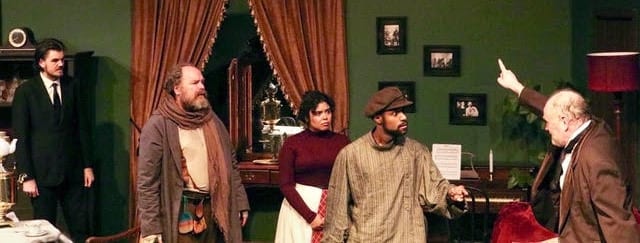There is a pervasive, deep-seated unhappiness which infects every character of DoubleDecker Productions’ Meshahnye. The first sign of this is Tatiana Vasilyevna, a young woman dressed sharply in a turn-of-the-century blouse and floor-length skirt, laid out on a couch with an utterly miserable expression. Actually, the first real sign is the audio clips of a family angrily and incoherently shouting over each other, which plays in the seconds before the lights go up. But it is Tatiana’s fantastically depressed scowl – which she manages to maintain even as her character cycles through rage, jealousy, and ennui – which sets the tone for the existential dread which weighs down the family at the center of Meshahnye.
Russian author Maxim Gorky’s play Meshahnye, known in English as The Philistines, is set in 1902 Russia in a small provincial village, in the home of a middle class family. The household consists of a husband and wife, their adult children, their lodgers, and their servants, and the set which makes up their home is wonderfully intricate and firmly places the audience into the environment of the characters. Complete with old chairs, tables, curtains, and even such details as an old metal stove and a pair of carved mallards, the set looks like a raid of the best antique stores and thrift shops of the East Village.
Though everyone appears to be assigned a role, no one is quite comfortable or content in them. The patriarch, Bessemenov (John Lenartz), screams and claws for a shred of authority over his wife, his children, and his household. The lady of the house, Akulina Ivanovna (played with heart-wrenching devotion by Isabella Knight), is never pleased with anyone and can never seem to please anyone in return, least of all her husband and children. She vacillates between the role of peacekeeper, and that of a desperate old woman clinging to a time gone by (most notably when she screeches that her adopted son is the “Antichrist!”).

The most unhappy in the household are Peter and Tatiana, Bessemenov’s children. Brought to life by Thomas Burns Scully and Annie Nelson, each is played so intensely that an aura of darkness seems to hang over both of them, even when they do nothing but sit sulkily in the corner of the room. In contrast to this brother/sister set are the only two in the house who can boast even a glimmer of happiness: Nil (Aaron Wright), the adopted son of Bessemenov and Akulina, and Nil’s fiancée Polya, a serving girl of the household. They each harbor a glow of optimism amidst a household of people who are uniquely dissatisfied with their lives. But even Nil, the sole character with the distinct ability to joke about the misery haunting the house, cannot help but get frustrated at being cooped up with people who, as he says, make cages out of everything.
One of the most engaging elements of this show is the new translation of Meshahnye by Leonid Grinberg and director Jenny Sterlin. Here, the divide between the the family’s miserable and hopeful is strikingly apparent. Peter, Tatiana, and even more so their parents speak in old-fashioned phrases and formal words. The easy-going, happiness-pursuing Nil, on the other hand, speaks more like a twenty-first century twenty-something. He deflects their complaints and tirades alike with light banter and modern vernacular, adding to the insinuation that he alone will be able to break out of the house’s gloom and carry on with his life. This particular twist offers a fascinating dynamic when, inevitably, shouting matches breaks out. Bessemenov’s stuffy (though loud) dialogue is as old-fashioned and unmoving as his stubborn ideologies, while Peter and Tatiana as as unwilling or unable to change as their stiff manner of speaking.
In a play that is distinctly Russian, everyone seems to be looking for an outlet to get to the root of their own unhappiness. But none of them can pinpoint what that is, or even what they are attempting to do. The final thirty minutes of the show seems to devolve into screaming, with characters turning on other characters with no method other than to expose each others’ miseries.

